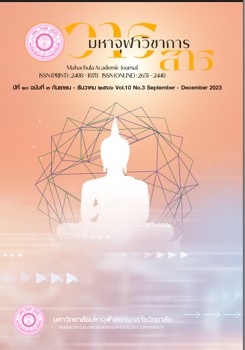Participatory household debt management model according Pto the sufficiency economy philosophy; Wang Hman sub-district Wat Singha district Chai Nat province
Main Article Content
Abstract
The aims of this research are: (1) to study agricultural household debts of community in Wang Hman sub-district Wat Singha district Chai Nat province (2) to study the causes which are influenced to agricultural household in debts formation of community in that place and (3) to study management model of agricultural household debts of community in participation. This is participatory research. It collected qualitative data by interview group seminar and public opinions from communities’ leaders, community members, and 20 of related people. Methodology to be used in this research are inductive and deductive management as well as sufficiency Economy Philosophical views.
The findings of the research are as follow. (1) Agricultural household debts are related with 3 situations namely, happened household debts status, debts management status, and the ability for paying debts. For happened household debts status, it was found that most of them are farmers. While geographical talking, the agricultural area is mostly plateau area, it can be done only in rainy season. Income for them can be only earned in the season. About debts management status, there was a common practice for them such as household accounting, networking and professional group building, the integration of the agricultural sector, and extension of time for payment of debt. For the ability for paying debts, they held together the alternative agriculture, increasing in income and learning for the agricultural improve. (2) The causes which are influenced to agricultural household in debts. There was found that they are usually occurred with these causes, changing of agricultural way, climate variant, agricultural investment, and contingent liabilities. (3) The management of the agricultural household debts, it was found that they used the form of Buddhist management along with the four Noble Truths. For the first step, it is building a coalition to know the problem (Duhkha). The ways to be practiced are joining forces of community, problem and solution learning, networking for participation, supporting and solution of problem with self-reliance. For the second way, it was the changing of behavior to know the source of problem and how to get rid of that (Samudaya). They were composed of analysis of source of problem, reducing of excess expenses in family and cultivate household accounting continuously and systematically. The third way was creation of friendships community to reach the destination of problem (Nirodha). They mostly were the building a society of rights and liberties, building a survival society, creating an alternative society and building a caring society. For the last step, it was the defining the development plan to the way of practice (Magga). It was composed of the system of allocating income and expenses, adding an option for income, fulfilling their potential and living a life of sufficiency.
Article Details

This work is licensed under a Creative Commons Attribution-NonCommercial-NoDerivatives 4.0 International License.
References
พระเทพเวที (ป. อ. ประยุทธ์ ปยุตฺโต). พุทธธรรม. พิมพ์ครั้งที่ ๓๐. กรุงเทพมหานคร: โรงพิมพ์มหาจุฬาลงกรณราชวิทยาลัย, ๒๕๖๓.
วันชัย วัฒนศัพท์. คู่มือการมีส่วนร่วมของประชาชนในการตัดสินใจของชุมชน. นนทบุรี: สถาบันพระปกเกล้า, ๒๕๔๔.
สุภางค์ จันทวานิช. วิธีการวิจัยเชิงคุณภาพ. พิมพ์ครั้งที่ ๑๒. กรุงเทพมหานคร: สำนักพิมพ์แห่งจุฬาลงกรณ์มหาวิทยาลัย, ๒๕๔๗.
ทศพร ศิริสัมพันธ์. หนี้ครัวเรือนไทย. [ออนไลน์]. แหล่งที่มา: https://www.prachachat.net/ [๓๐ พฤจิกายน ๒๕๖๓].
สำนักงานกองทุนสนับสนุนการเสริมสร้างสุขภาพ(สสส). [ออนไลน์]. แหล่งที่มา: https://www.thaihealth.or.th/ [๓๐ ธันวาคม ๒๕๖๓].
สำนักงานคณะกรรมการกองทุนการสร้างเสริมสุขภาพ. พระราชดำรัสเกี่ยวกับการดำเนินชีวิต. [ออนไลน์]. แหล่งที่มา: https://shorturl.asia/IMCS [๓๐ พฤศจิกายน ๒๕๖๓].
องค์การบริหารส่วนตำบลวังหมัน อำเภอวัดสิงห์. สภาพทั่วไป. [ออนไลน์]. แหล่งที่มา: https://www.wangmun-chainat.go.th/condition.php [๗ ธันวาคม ๒๕๖๓].
สัมภาษณ์ผู้ทรงคุณวุฒิ
กฤษฎา สุภรศิริวรกุล. กำนันตำบลวังหมัน อำเภอวัดสิงห์, ๒๐ ธันวาคม ๒๕๖๓.
ออสอ จิตจุน. นายกองค์การบริหารส่วนตำบลวังหมัน อำเภอวัดสิงห์, ๒๐ ธันวาคม ๒๕๖๓.
อำนาจ อุ่นทอง.ปลัดองค์การบริหารส่วนตำบลวังหมัน อำเภอวัดสิงห์, ๒๐ ธันวาคม ๒๕๖๓.


